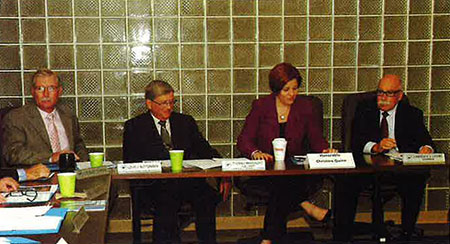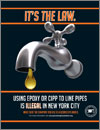NYC COUNCIL SPEAKER QUINN AT FOUNDATION MEETING

(l. to r. – Louis J. Buttermark, Treasurer; Thomas Maniuszko, Vice Chairman; Honorable Christine Quinn, NYC Council Speaker; Lawernce J. Levine, Chairman)
The Foundation routinely has guest speakers at its Board of Directors’ meetings. During the latest meeting, the Board, and distinguished industry stakeholders, were honored to have New York City Council Speaker, and potential 2013 mayoral candidate, Christine Quinn in attendance. The Board appreciated the Speaker’s appearance which gave the plumbing industry the opportunity to talk about a variety of topics from enforcement against unlicensed plumbers and cover-up plumbers, how the plumbing industry can assist in making the City more “Green”, Building Code issues, etc.
The Foundation would like to thank Speaker Quinn for meeting with the Foundation. As the plumbing industry’s clearinghouse, City officials regularly request our advice because they realize that licensed plumbers are on the front-line protecting the health and safety of all New Yorkers. Licensed plumbers are responsible for more than leaky pipes. Just to list a few additional obligations of a NYC Master Plumber: they maintain and install medical gas lines in hospitals, connect gas lines to appliances like gas stoves, and install backflow devices which prevent water contamination.
NEWS FROM DEP
The NYCDEP grease interceptor informational video was launched by DEP to improve the way New York City serves businesses and educates operators on proper grease disposal. The video can be viewed at:
The three-minute online video-developed by Inform NYC and produced by NYC Media-explains what businesses need to know about their grease interceptor, including proper installation and maintenance.
Every business that produces and disposes of fat, oil and grease must have an interceptor system to prevent the discharge of grease into the City’s sewer system. This discharge interceptor will help reduce sewer blockages and backups that can impair waterways, damage property, and affect public health.
NEWS FROM DOT: 2012 HOLIDAY CONSTRUCTION EMBARGO
A special Holiday Construction Embargo shall be in effect on Friday, November 16, 2012 from 6AM to 11:59PM and again from Monday, November 19, 2012 from 6AM through Wednesday, January 2,2013 11:59PM. Roadway and sidewalk construction activities will be restricted during the embargo period on the streets listed below.
Any permits issued prior to the date of this notice, for work during this embargo period on the streets listed below which do not already have the permit stipulation “410” are hereby suspended for the period noted above. All permittees must comply with this embargo unless a special waiver is granted by OCMe. Waiver requests must have been filed by November 9, 2012 in the Permit Office by filing a “Request for Roadway/Sidewalk Permits During Embargo Periods” and submitting supporting documentation. Waiver requests should only be submitted for critical reasons for a specific project. If a waiver is granted, the applicant will be notified so they can apply for the approved permits. Waivers are not required for ongoing Building Construction Activity Permits which already include the “410” permit stipulation.
Prior to this embargo period all necessary measures must be taken so that all roadways and sidewalks are in proper condition to allow for the expeditious and safe movement of vehicular, bicycle and pedestrian traffic. The opening of utility access covers is prohibited on any of the street noted below between the hours of 6:00 AM and midnight unless the utility or contractor files for an Emergency Authorization Number as required by section 2-07 of the Department’s Highway Rules. The planned opening of utility access covers may occur during the hours of 12:01AM and 5:59AM where no authorization number is required.
Please note that this embargo only applies to DOT construction permits.
For a complete listing of all locations please use the link below:
http://www.nyc.gov/html/dot/html/motorist/trafalrt.shtml#holiday
PIPE LINING
As a reminder, the use of cured-in-place pipe (CIPP) and epoxy spray pipe lining is illegal in NYC. Pipe lining is not allowed to be used on water supply and distribution systems, sanitary drainage systems, and storm drainage systems in accordance with the Department of Buildings Bulletin 22/2011.
http://www.nyc.gov/html/dob/downloads/bldgs_bulletins/bb_2011-022.pdf
Below is the cover-page from the Foundation’s advertisement on pipe lining. We suggest all Licensed Master Plumbers educate/inform their clients to the banned use of pipe lining in the City.

It’s The Law.
Using Epoxy or CIPP to Line Pipes is Illegal in New York City
Make sure the company you use is a Licensed Plumber.
FOUNDATION’S ENVIRONMENTAL STATEMENT
Since its establishment in 1986 the Plumbing Foundation has worked diligently to ensure that the plumbing industry has as little a “carbon footprint” on New York City as possible. The plumbing industry has historically utilized environmentally friendly materials like recycled cast-iron and copper piping/fittings. The Foundation will continue its role of protecting New York City as well as being an advocate for the environment by strengthening its water/sanitary regulations thereby the City’s wasteful water consumption.
THE PIPECASTER is published by The Plumbing Foundation City of New York, 44 West 28th Street., 12th Floor. New York, New York; (212) 481-9740; Fax: (212) 481-7185. Lawrence J. Levine, Chairman; Thomas Maniuszko, Vice Chairman; Louis J. Buttermark, Treasurer; Stewart O’Brien, Executive Director; Terence O’Brien, Editor. Board of Directors: George Bassolino, Paul Belli, Irwin Brenner, Marc Breslaw, Raymond Cardoza, Lawrence J. Levine, Scott Lyons, Robert Ricco, John Scarpinito